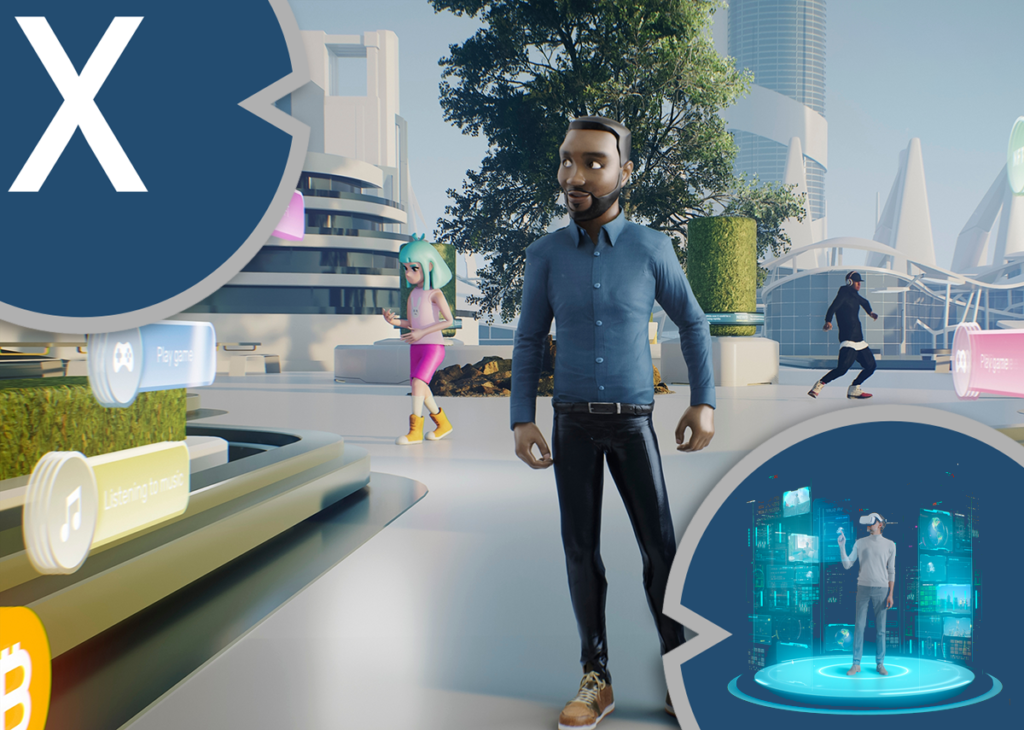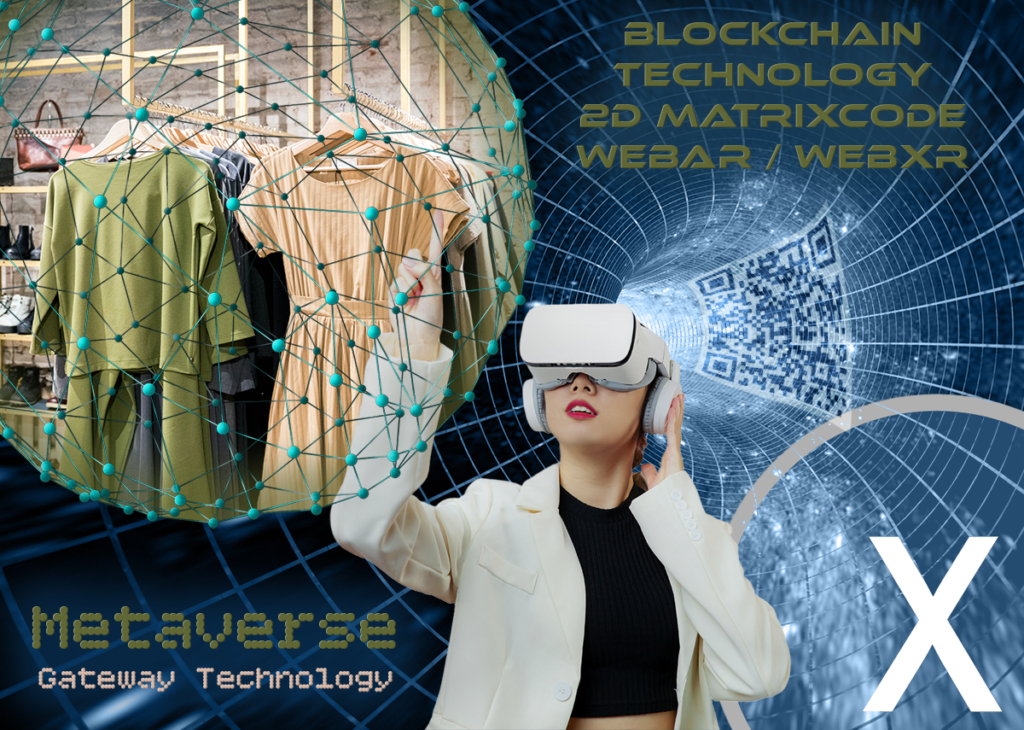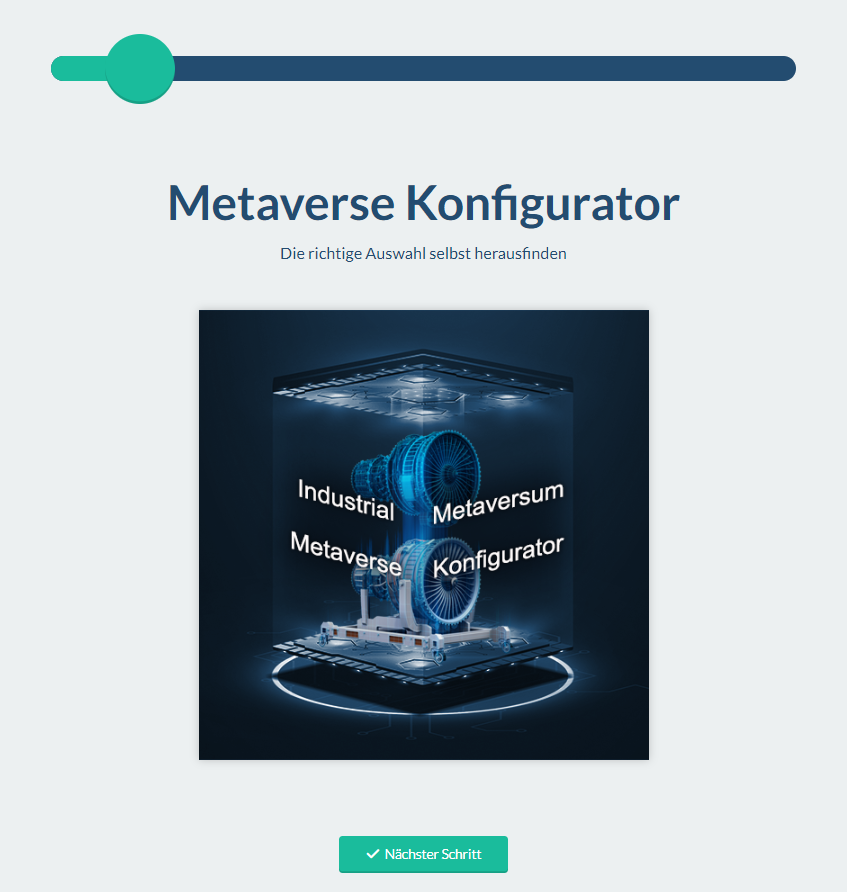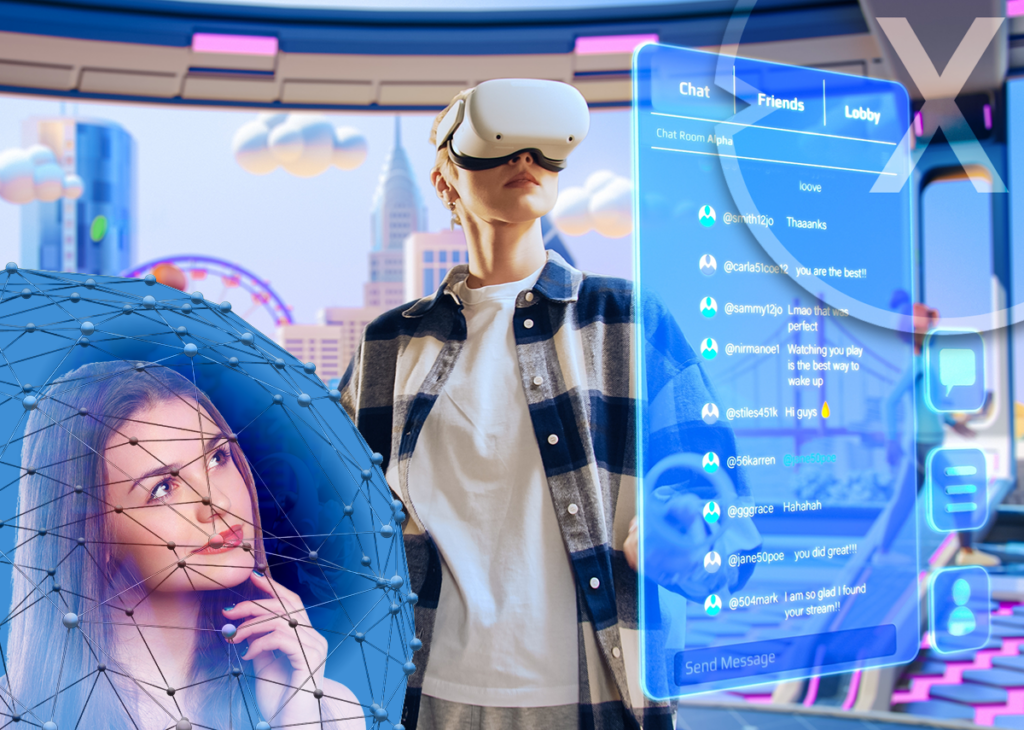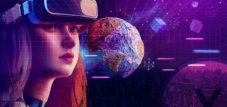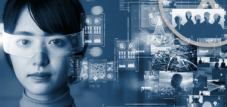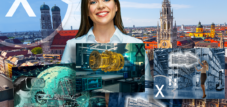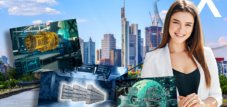Metaverse in the EU - Insight into the augmented, extended, virtual and mixed reality of European XR technology & Web 4.0
Language selection 📢
Published on: October 11, 2023 / Update from: October 11, 2023 - Author: Konrad Wolfenstein
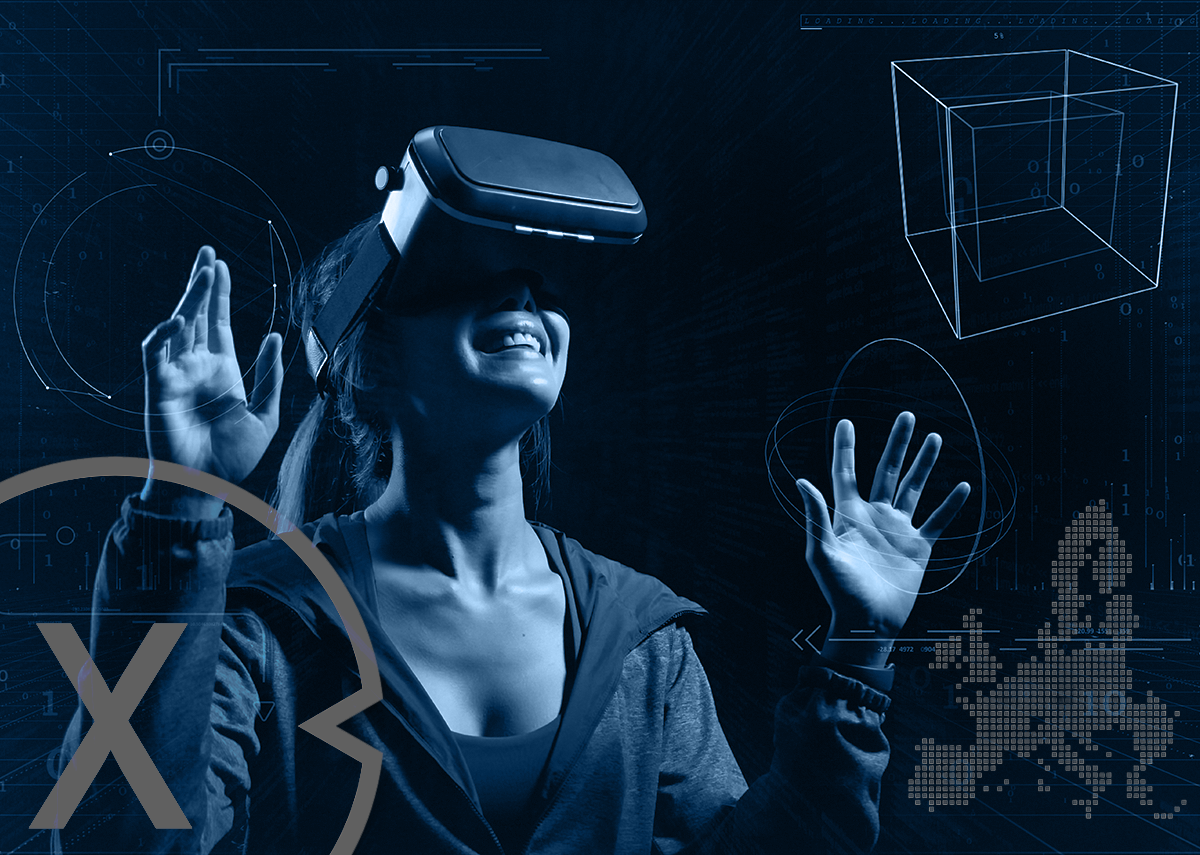
Metaverse in the EU – Insight into Augmented, Extended, Virtual and Mixed Reality – Image: Xpert.Digital
🌐 The Metaverse and the EU
The Metaverse represents an emerging and rapidly developing area in the world of technology. The importance of this concept cannot be overlooked in the European Union either. From start-ups to established companies, and from scientific research institutes to government initiatives, the continent is deeply engaged in the various forms of extended reality (XR) that enable the metaverse. Below we provide a comprehensive overview of developments in the areas of augmented reality (AR), extended reality (ER), virtual reality (VR) and mixed reality (MR) within the EU.
🔍 Augmented Reality (AR)
AR applications have found their place in the industry. They are used for training, maintenance and also in medicine. A good example is the use of AR glasses to assist surgeons during surgery. A digital overlay displays important information directly in the field of view, eliminating the need for the surgeon to look at an external monitor. There are also public AR initiatives, for example in the form of city tours, in which tourists receive information about sights directly in their field of vision.
🎮 Virtual Reality (VR)
VR is not only used for entertainment purposes in the EU. Rather, it has found applications in many other areas. From architecture to medicine, VR enables a new dimension of interaction and simulation. VR is used in education to convey complex topics in a clear way. For example, students can take a virtual journey through the human heart or tour ancient ruins without leaving the classroom.
🌌 Extended Reality (ER)
Extended Reality serves as an umbrella term for all immersive technologies, including AR, VR and MR. In the EU, ER is being intensively researched to further explore the limits of these technologies. The main goal is to create a fully immersive environment where the physical and digital worlds merge seamlessly. This often involves using multiple sensors and artificial intelligence technologies to create a credible simulation of reality.
🔗 Mixed Reality (MR)
MR is a fusion of AR and VR and offers the best of both worlds. Here real and virtual elements can interact in a common space. This is of great importance in areas such as telemedicine, where doctors and patients are able to access medical data and the physical patient at the same time through MR glasses. MR applications are also used in the automotive industry to help developers design new models.
⚙️ Industrial applications and societal impacts
XR technologies are not just a trend, but an important economic factor in the EU. They offer enormous opportunities for industry, from improving production processes to creating new business models. At the same time, the technology raises ethical and social questions, for example in the areas of data protection and human interaction. It is therefore important that regulatory authorities and ethics committees address these technologies in order to promote responsible use.
🎯 XR technologies in the EU
The Metaverse and associated XR technologies are on the rise in the EU. The applications are diverse and range from medicine to the entertainment industry. However, in order to realize the full potential of these technologies, it is necessary to invest in research and development and to clarify ethical and regulatory issues. The EU has the potential to take a leadership role in this exciting and promising technology area, provided the opportunities and challenges are equally addressed.
📣 Similar topics
- 🌐 EU's role in the metaverse
- 🏥 Medical applications of AR and VR
- 📚 Education in the age of extended reality
- 🚗 Extended Reality in the automotive industry
- 🎭 Entertainment meets virtual reality
- 🛠️ Industrial use of XR technologies
- 🏛️ Regulation and Ethics in the Metaverse
- 🎓 Training and further education through AR
- 📊 Business models in the XR area
- 🌍 Global trends in augmented and virtual reality
#️⃣ Hashtags: #Metaverse #ExtendedReality #AugmentedReality #VirtualReality #EUinTech
🌍🤖 Augmented realities and information about XR technology in various European countries
XR technology, which includes augmented reality (AR), virtual reality (VR) and mixed reality (MR), has become an integral part of the European technology landscape. Different countries have each developed their specific strengths and focus areas in this innovative sector.
🇩🇪🔬 Germany: A lighthouse of research and industrial application
Germany plays a leading role in the research and development of XR technologies. AR and VR applications are particularly widespread in industry. Starting from the automotive industry, where virtual prototypes are tested, for example, to medical technology, where operations supported by AR are being used more and more frequently. There are also numerous research institutes and universities that are working intensively on further developing the technology.
🇬🇧💡 Great Britain: breeding ground for start-ups and academic excellence
A vibrant start-up scene in the field of XR technologies has developed in Great Britain. British universities are also leaders in research and teaching in the field of augmented reality. From game development to use in architecture, the country offers a wide range of application and research opportunities. London in particular has a high density of companies and research institutions that focus on this sector.
🇫🇷🎨 France: Art meets technology
France is known not only for its art and culture, but also for its innovative use of XR technologies in these areas. Many museums offer virtual tours or AR experiences that immerse visitors in the art. In addition, the start-up scene is growing, which is actively supported by the French government through various funding programs. A cluster for technology and innovation has developed in Paris in particular.
🇸🇪💻 Sweden: Technology Integrated Innovation Center
Sweden is considered one of the most innovative countries in Europe and consistently relies on the use of XR technologies in a wide variety of areas. Whether in education, where virtual classrooms are being used more and more often, or in industry, for example in factory automation: XR is firmly anchored in Sweden. Stockholm has established itself as a hotspot in the scene, with a number of companies and research institutes driving the technology forward.
🇫🇮🎮 Finland: Playing into the XR world
Finland is internationally known for its strong gaming industry. Companies like Supercell and Rovio are just two of the prominent names. With this strength in gaming, Finland has also made significant progress in the development of VR and AR applications. From gaming applications to serious industrial applications, the country offers a wide range of innovative solutions.
🇪🇺🤝 EU-wide support and partnerships
The European Union as a whole has recognized the potential of XR technologies and is actively promoting their development and application. A favorable ecosystem for the development of these technologies is created through various funding programs and the creation of partnerships between Member States. These initiatives contribute to Europe being seen as a serious player in this area by global standards.
📝🌟 Possible applications of XR in Europe
The European XR landscape is diverse and dynamic. Each country brings its own strengths and specialties that enrich the overall picture. From industrial heavyweight Germany to start-up-friendly Great Britain to culturally innovative France, it shows how diverse the possible applications of XR are in Europe. With EU support and collaboration across national borders, Europe has the opportunity to play a leading role in the global XR sector.
📣 Similar topics
- 🇩🇪 Germany's role in XR technology: research and industry
- 🇬🇧 Britain's vibrant XR start-up scene
- 🇫🇷 Art and XR technology: France's innovative approach
- 🇸🇪 Sweden's influence on XR technology in education and industry
- 🇫🇮 Finland: From gaming to XR innovation
- 🎮 Use of XR technology in the European gaming industry
- 🏥 Medical applications of XR technology in Europe
- 🇪🇺 EU initiatives to promote XR technology
- 🌐 Europe's position in the global XR market
- 🤝 European partnerships in XR technology
#️⃣ Hashtags: #XRinEurope #DeutschlandXR #GB_XRStartups #FranzösischeXRArt #EU_XRInitiatives
Smart City Metaverse & Web 4.0: From the Industrial, Business and E-Commerce Metaverse to the EU Citiverse?
More about it here:
🌐 The further development of the Internet: Web 4.0 and the EU strategy
The European Commission has ambitious plans to actively shape the next phase of technological evolution through a comprehensive strategy for Web 4.0 and virtual worlds. The goal is to create a digital landscape that is not only open and secure, but also inclusive.
🤔 What is Web 4.0?
The term Web 4.0 does not yet have a uniform definition because the Internet is constantly evolving. Nevertheless, the expression describes a future stage of development of the Internet that goes far beyond the previously known semantic web or Web 3.0. While Web 3.0 focuses primarily on machine-readable information and the networking of knowledge, Web 4.0 focuses on connecting advanced technologies. These include artificial intelligence (AI), augmented reality (AR), virtual reality (VR) and the Internet of Things (IoT).
👤 The focus is on people
Margrethe Vestager, Executive Vice-President of the European Commission, emphasized the need to put people at the forefront of Web 4.0 development. She explained that Web 4.0 and virtual worlds not only bring health benefits, but can also help combat climate change and improve prediction of natural disasters. It is crucial to uphold the digital rights and fundamental principles of the European Union, particularly with regard to issues of privacy and the spread of misinformation.
🛠️ Examples of technological integration and areas of application
🩺 Healthcare
One area where Web 4.0 could have a significant impact is healthcare. By integrating AI into diagnostic procedures and using AR/VR for medical training, doctors could work more effectively and patients could receive better care.
🌿 Environmental protection
In the context of the green transition, the advanced technology could be used to monitor environmental conditions. For example, IoT sensors could contribute to the early detection of forest fires, while AI models could optimize energy consumption in smart cities.
🚨 Disaster forecast
The ability to better predict natural disasters would be another potential application. By using advanced algorithms and massive data analysis, early warning of earthquakes, floods or storms could be provided, which would enable lives to be saved.
⚠️ Challenges and risks
However, there are also serious concerns about the risks associated with advancing Web 4.0. The potential threat to privacy and the possibility of spreading disinformation are just two examples. Therefore, ethical frameworks and data protection guidelines are essential.
🔒 Privacy and data sovereignty
The use of IoT devices and AI algorithms raises serious questions about privacy. Therefore, developing privacy policies and technologies is crucial to prevent misuse of personal information.
🌟 Great potential from healthcare to environmental protection
Web 4.0 offers enormous potential for advancements in various areas, from healthcare to environmental protection. But these technologies are not without their challenges and risks. It is crucial that development takes place in accordance with EU digital rights and core principles to create a balanced and sustainable digital ecosystem for all. This is the only way the EU can ensure that Web 4.0 offers an open, safe and inclusive environment for everyone.
📣 Similar topics
1️⃣ What is Web 4.0?
🌐 2️⃣ EU strategy for the digital future 🇪🇺💡
3️⃣ Technologies in web 4.0: KI, AR, VR and IoT 🤖🔗
4️⃣ The person in the focus of Web 4.0 development 👨💻🌟
5️⃣ Health system 4.0: How web 4.0 The medicine changed 🏥👨⚕️
6️⃣ Environmental protection through Web 4.0 🌳🌍
7️⃣ Disaster forecasting with Web 4.0 🌪️⚠️
8️⃣ Risks and ethical challenges of Web 4.0 ⚖️🚫
9️⃣ Data protection in the era of Web 4. 0 🔒📊
🔟 Inclusivity and digital rights in Web 4.0 🌈📜
#️⃣ Hashtags: #Web4 #EUStrategy #DigitalFuture #TechnologyIntegration #DigitalEthics
🗒️ Xpert.Digital: A pioneer in the field of extended and augmented reality
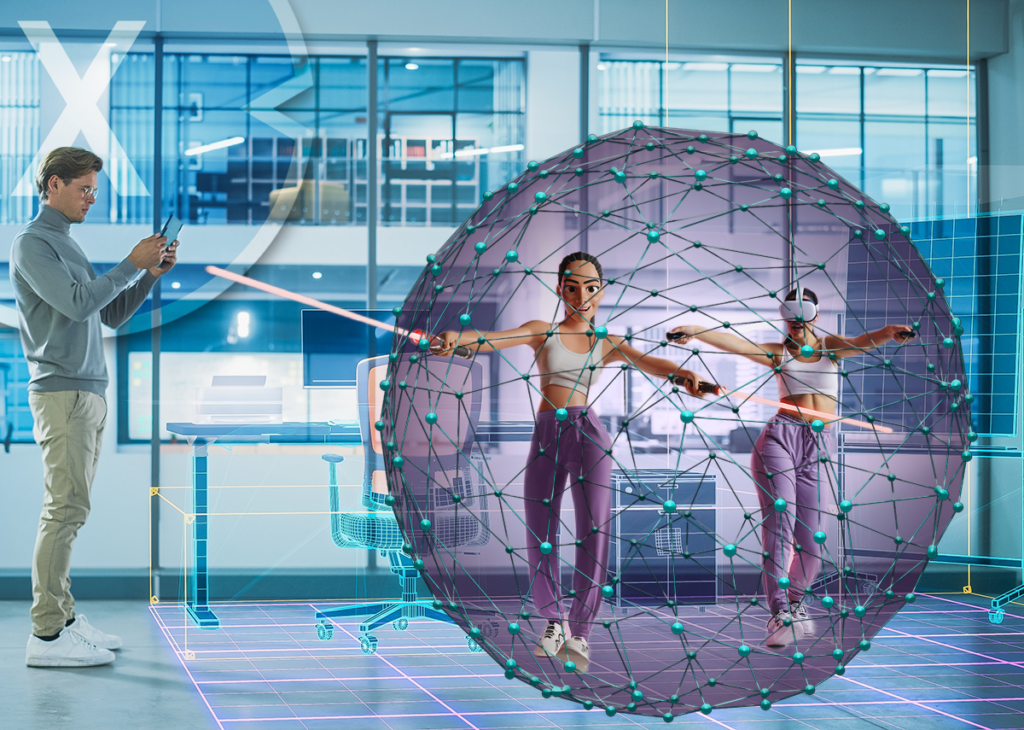
Find the right Metaverse agency and planning office such as a consulting firm - Image: Xpert.Digital
🗒️ Find the right Metaverse agency and planning office such as a consulting firm - search and search for top ten tips for consulting & planning
In the age of digitalization, where technologies such as Extended Reality (XR) and the Metaverse are constantly becoming more relevant, Xpert.Digital positions itself as an opinion leader and pioneer. With over 1,500 specialist articles, Xpert.Digital has established itself as a central point of contact for the industry.
🌌 Extended Reality (XR): The best of both worlds
Extended Reality is a collective term that includes virtual reality (VR), mixed reality (MR) and augmented reality (AR). Xpert.Digital is committed to creating immersive XR experiences that are both informative and entertaining.
- Interactive Experiences: XR allows users to immerse themselves in virtual worlds and interact with their surroundings in ways previously unimaginable.
- Education and Training: XR can be used for educational purposes to convey complex topics and concepts in an understandable and tangible way.
- Entertainment: Whether games, films or art – XR opens new horizons in digital entertainment.
🔮 Augmented Reality (AR): See the world through digital eyes
Augmented Reality, a particular focus of Xpert.Digital, makes it possible to integrate digital information or graphics into the real world. The possibilities are nearly unlimited.
- Marketing and Advertising: AR can be used to create interactive advertising campaigns that engage customers in a whole new way.
- Everyday help: From navigation apps that project the route directly onto the street to furniture apps that show what a new sofa would look like in the living room - AR makes it possible.
🌐 The Metaverse: The Next Big Thing
The Metaverse is a virtual world where people can interact through avatars and create shared experiences. Xpert.Digital recognizes the enormous potential of the Metaverse and is working to translate this potential into usable products and services.
- Social Interaction: The Metaverse offers the opportunity to connect with people from all over the world and share common experiences.
- Economy and trade: Virtual goods and services can be traded in the metaverse, which opens up completely new business models and sources of income.
- Creative Freedom: From building your own worlds to designing custom avatars, the Metaverse is a place of endless creative possibilities.
🚀 Xpert.Digital at the forefront of innovation
Xpert.Digital shows how a company can be at the forefront of the technological revolution. With their focus on XR, AR and the Metaverse, they are well positioned to shape and define the future of digital interaction.
More about it here:
🌐 The importance of digitalization and Web 4.0 for the EU economy in the 21st century
The report on the economic future of the European Union beyond 2030, published in March '23, places great emphasis on the role of digitalization. In particular, he highlights the potential of Web 4.0, which promises an intelligent, immersive and seamlessly connected world. Expressed in numbers, the global market volume for virtual worlds is expected to grow from 27 billion euros in 2022 to an overwhelming 800 billion euros by 2030.
💼 The digital revolution as an economic engine
Digitalization is no longer a dream of the future, but rather the melody of the here and now. It has revolutionized the way business is done, products are developed and services are delivered. Companies that adapt to digital trends early on can benefit from enormous economic growth. It's not just about automating processes, but also using big data, artificial intelligence and other advanced technologies to better respond to consumer needs.
🌐 Web 4.0: The next stage of digital development
Web 4.0 is often referred to as the “intelligent web” or “semantic web”. It enables a deeper interaction between man and machine and is expected to integrate the Internet of Things (IoT), virtual reality (VR) and augmented reality (AR). The effects of these technologies will be noticeable in many industries, from health care to the automotive industry.
🎮 Virtual worlds as an emerging market
A particularly striking aspect is the rapid increase in the market volume for virtual worlds. It is no longer just the gaming industry that benefits from this development. Virtual conference rooms, digital museums and interactive learning platforms are just a few examples of how virtual worlds are becoming more and more part of our everyday lives.
🇪🇺 European strategies to promote Web 4.0
The European Union has recognized the need to invest in these emerging technologies. The development of strategies to promote Web 4.0 shows that the EU is committed to being at the forefront of technological change. Laws, subsidies and educational programs attempt to create a favorable climate for innovation.
⚠️ Challenges and risks
Of course, there are also challenges and risks that come with the rapid development of Web 4.0 and general digitalization. These include issues of data security, data protection and ethical responsibility. It is crucial that these issues are adequately considered as part of strategy development.
🔮 Digitalization and Web 4.0
Digitalization and the emergence of Web 4.0 are more than just technological advances; they are the driving forces that will shape the economy and society of the 21st century. With a global market volume for virtual worlds predicted to reach €800 billion by 2030, there is a lot at stake. The European Union has already taken concrete steps not only to follow these trends, but to actively shape them. It is an exciting time full of possibilities, but also a time when responsible action and sustainable planning will be crucial.
📣 Similar topics
1️⃣ Digitization: The pace setter of the EU economy
2️⃣ Web 4.0: The intelligent web of the future
3️⃣ The role of big data and AI in the EU economy
4️⃣ Virtual worlds: From games to business models
5️⃣ Europe's strategy for Web 4.0: A plan for the Future
6️⃣ Internet of Things: The Impact on the EU Economy
7️⃣ The Economic Impact of VR and AR in the EU
8️⃣ Data Protection in the Era of Web 4.0
9️⃣ Challenges of Digitalization: Ethics and Security
🔟 Economic Growth through Digitalization: Facts and Forecasts
#️⃣ Hashtags: #Digitalization #Web4.0 #EUEconomy #VirtualWorlds #TechnologicalChallenges
🛒 V-Commerce: The ingenious hybrid shopping model 🛍️ Also applicable for hybrid trade fairs 🎪🤝 and events 🌐🎉
V-Commerce, a combination of “virtual” and “commerce”, is a new hybrid model for retail that can also easily be used at hybrid trade fairs and events. Imagine blurring the lines between online and offline shopping, opening up endless possibilities for buyers and sellers alike. This model can also be used as a cross-border solution, which makes it particularly interesting for internationally operating companies.
More about it here:
🌐 Virtual realities and their social significance: A further development of the EU strategy
In the progressive era of digitization, virtual worlds change from a niche phenomenon to an integral part of our society. This change has immense possibilities and serious challenges. The European Union has developed a comprehensive strategy to control this dynamic development. The focus is on the creation of a “Web 4.0”, which embodies the basic values and principles of the Union. Here, human rights are to be respected without restrictions and European companies are to be funded.
🛠️ Main components of the EU strategy
The orientation of this strategy is closely linked to the existing political program for the “digital decade” until 2030. The main pillars of this program can be divided into four categories: competence development, promotion of companies, modernization of public services and infrastructure structure. Above all, the latter, represented by the efforts of the EU in the area of data centers, cloud technologies and edge computing, forms the basis for the implementation of the strategy.
🎓 Skills development
The need to promote digital skills across the population cannot be overstated. This is not just about training IT specialists, but about empowering all citizens to move safely and efficiently in virtual worlds. Specialized training programs could help achieve high levels of digital literacy.
🏢 Business support
Another important aspect is creating a business-friendly climate. European companies, especially start-ups in the tech sector, should be supported through tax incentives, funding and networking. The goal is to establish Europe as a global leader in the development and application of Web 4.0 technologies.
🏛️ Public services
Modernizing public services through the integration of digital technologies can bring significant efficiency improvements and cost savings. Whether it's about online administrative procedures, telemedical care or digital education, the options are diverse and promising.
🌍 Global governance and openness
In addition to promoting internal developments, the EU strategy addresses the international dimension of virtual worlds. The aim is to establish standards and guidelines that enable global, ethical use. This also includes creating a framework for fair, global governance.
⚖️ Opportunities and risks
It is essential to consider both the positive and negative aspects of integrating virtual worlds into our daily lives.
🌈 Opportunities
Social inclusion
Virtual worlds can help break down barriers and connect people regardless of geography or physical limitations.
Economic growth
The creation of new business models and jobs in this area can contribute significantly to economic prosperity.
innovation
Rapid technological development is driving innovation in a wide range of sectors, from medicine to space travel.
⚠️ Risks
data protection
The question of how personal data can be protected in the digital world is becoming increasingly pressing.
Digital divide
Without appropriate funding programs, the technology could exacerbate social inequalities.
Ethics and morals
Issues such as cyberbullying or the spread of hate speech in virtual spaces require urgent discussion.
🌟 The challenges are complex
The challenges are complex, but the EU strategy offers a comprehensive approach to navigating this novel landscape. Through a combination of education, economic support and ethical regulation, the European Union strives for an inclusive and sustainable development of virtual worlds, consistent with its core values and principles.
📣 Similar topics
- 🌐 Web 4.0: The vision of the European Union
- 🛠️ The four pillars of the EU digital strategy
- 🎓 Digital literacy for all: Why skills development is important
- 🚀 Start-ups in the EU: funding and opportunities
- 🏛️ Digital transformation of public services in the EU
- 🌍 Global standards for virtual worlds: The EU as a pioneer
- 🤝 Social inclusion through virtual reality
- 📈 Economic prospects of digitalization in Europe
- 🛡️ Data protection in a digital world: EU guidelines
- 🧭 Ethics and morality in virtual spaces: An EU approach
#️⃣ Hashtags: #Web4_0 #EUDigitalStrategy #DigitalLiteracy #BusinessPromotion #Data Protection
Our Industrial Metaverse configurator
Just try out our universally applicable (B2B/Business/Industrial) Metaverse configurator for all CAD / 3D demo options:
Xpert (B2B/Business/Industrial) Metaverse configurator for all CAD / 3D data can be used on all devices, one platform!
Suitable for:
🌐 EU strategy for Web 4.0 and virtual worlds
The European Union plans to develop an industrial ecosystem for Web 4.0 that combats fragmentation and unites all relevant actors in the value chain. This is intended to help expand excellence in this area.
🔬 Research and partnerships
This includes not only the promotion of research and development, but also the practical application of these technologies. The EU is therefore planning to establish a partnership for virtual worlds as part of the Horizon Europe program, which could become operational from 2025.
🌐 Current state of the EU ecosystem
There is currently no coherent EU ecosystem that connects the various actors in the areas of Web 4.0 and virtual worlds.
📋 Key points of the strategy
Horizon Europe Partnership
A Horizon Europe partnership is proposed from 2025. This is intended to promote research and development and develop a roadmap for virtual worlds.
Promotion of creative people and media companies
The EU plans to support creatives and media companies by testing new creative tools and connecting developers with industrial users.
Real-world laboratories for Web 4.0 and virtual worlds
In collaboration with the member states, “real-world laboratories” are to be set up to promote innovation.
🎯 Goals of the strategy
The aim is to create a strong European ecosystem for Web 4.0 and virtual worlds, aiming at excellence in research, technology and innovation.
🌐 Commission and its role
The European Union has ambitious goals in the area of digital transformation, particularly in relation to the development of a strong industrial ecosystem for Web 4.0. The need for a coordinated approach is undeniable as Europe needs to remain competitive in a world of digital transformation and technological innovation. The lack of an integrated EU ecosystem that brings together all relevant actors in the value chain of virtual worlds and Web 4.0 is a pressing issue. This is where the Commission's strategy comes into play.
🤝 Partnership for virtual worlds
The idea of a virtual world partnership under the Horizon Europe program, which could become operational from 2025, is an important step in this direction. The aim of this partnership would be not only to promote excellence in research, but also to create a comprehensive industrial and technological roadmap for the development of virtual worlds. This would ensure a coordinated approach and help combat the fragmentation of efforts at EU level.
💡 Practical application
However, it is not only important to create a strong research and development ecosystem, but also to promote the application of these technologies in practice. The Commission therefore plans to actively support creative people and media companies in the EU. A particular focus is on developing new creative tools that can be tested by these companies. This offers an ideal platform for collaboration between developers, industrial users and creative people to find solutions to real-world challenges together.
🔬 Real-world laboratories and innovation
In addition, the Commission will work with the Member States to develop “real laboratories for web 4.0 and virtual worlds”. These laboratories could serve as test environments for innovative ideas and products and promote cooperation between different sectors such as healthcare, education, transport and energy. Such real laboratories could serve as incubators for start-ups and SMEs that want to test the latest technologies in real application scenarios.
🛡️ Security and privacy
It is also crucial that the EU recognizes the importance of data and cybersecurity in the context of Web 4.0. A secure digital space is important not only for protecting citizens' privacy, but also for the trustworthiness and reliability of the entire ecosystem. Therefore, another aspect of the partnership could be the development of security protocols and standards that ensure the integrity of virtual worlds and Web 4.0.
🏗️ Infrastructure and education
In addition, EU member states should be encouraged to invest in the necessary infrastructure. This includes not only the technical infrastructure such as high-speed internet and data centers, but also the training and development of the workforce who must be able to use the new technologies effectively.
📜 Ethical aspects
Furthermore, the EU must take into account the ethical aspects of the development and use of these technologies. Incorporating ethical considerations into the development process is essential to ensure that technologies are used in a way that reflects European values.
🌟 The vision of the European Commission
The European Commission has outlined a vision for a thriving, integrated and innovative European ecosystem for Web 4.0 and virtual worlds. By combining research excellence, business application, cross-sector collaboration and a strong emphasis on security and ethics, the EU can take a leading role in the next phase of the digital revolution.
📣 Similar topics
1️⃣ EU's Vision for Web 4.0: A Guide
2️⃣ Horizon Europe Partnership and Virtual Worlds: What awaits us in 2025?
3️⃣ Real-world laboratories in focus: Test environments for Web 4.0 and virtual worlds
4️⃣ Creative and media companies: How the EU supports
5️⃣ Integrated EU ecosystem: An urgent problem
6️⃣ Promoting research and development in Web 4.0
7️⃣ Cybersecurity and data protection in the EU's Web 4.0 plan
8️⃣ Technological roadmaps: The EU strategy for the development of virtual worlds
9️⃣ Investing in the future: Infrastructure and education for Web 4.0
🔟 Ethics in technology: An EU approach
#️⃣ Hashtags: #Web4_0 #HorizonEurope #EUStrategy #VirtualWorlds #RealLaboratories
🗒️ If you don't understand something or need advice, we also offer training and workshops
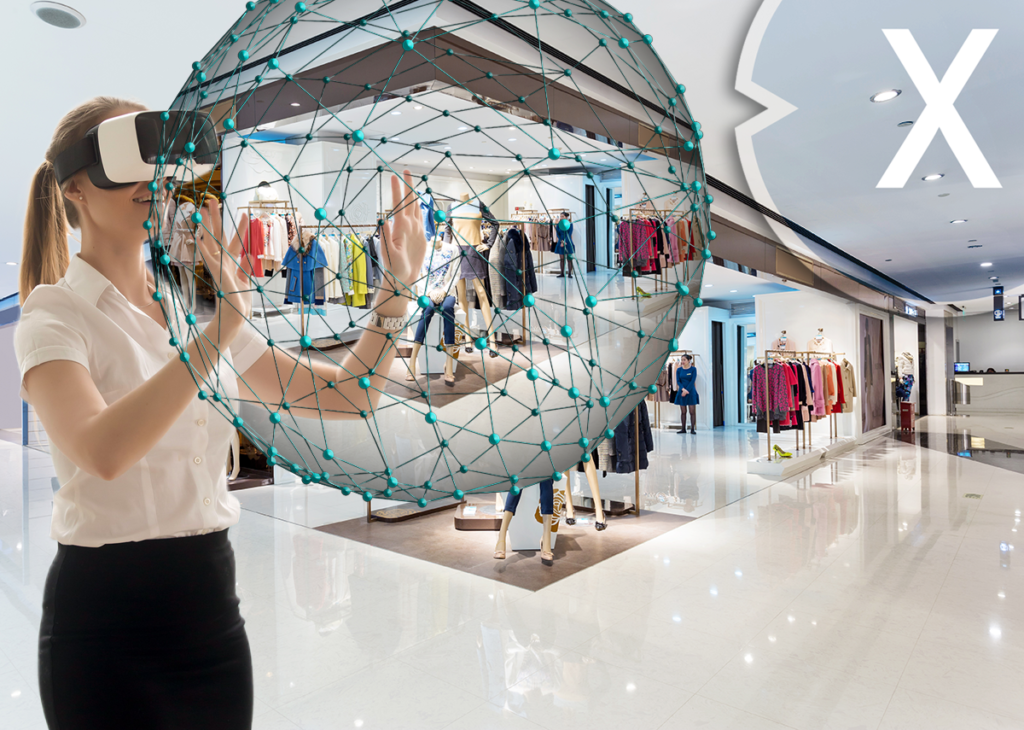
Metaverse & Extended Reality training, lecture or workshop for augmented, mixed and virtual reality – Xpert.Digital
In today's digital era, technology is evolving at a rapid pace. There are constantly new terms and technologies that need to be understood and mastered. If you're having trouble keeping up with topics like Metaverse, XR technologies, or immersive 3D, you're not alone.
More about it here:
🌐 A sustainable metaverse: More than just virtual reality
The Metaverse is often described as a limitless virtual world in which people can interact and express themselves creatively. But it is much more than just a technological innovation; it is an ecosystem with potential that goes far beyond purely economic interests. To be truly successful and useful to humanity, this ecosystem must be made sustainable.
🇪🇺 The European Perspective: Green Growth and Net Zero
Sustainable growth is a main concern in the European Union. The “European Green Deal” is a comprehensive concept that aims to transform the EU into a modern, resource -efficient and competitive economy. This also includes the transition to a climate -neutral economy in order to minimize the massive economic losses due to climate -related events that amount to around 487 billion euros in the past 30 years.
♻️ Sustainability in the design of the metaverse
When we think about the metaverse and its associated technologies, we must not only see the entertainment value and the new business models. Rather, we need to integrate reducing greenhouse gas emissions, increasing energy efficiency and using big data for decision-making in key areas such as climate change, agriculture and waste management.
✈️ The replacement for physical travel
An interesting way to do this is to reduce business and leisure travel. Before the COVID-19 pandemic, air travel accounted for about 2.5% of global CO2 emissions. Using the Metaverse could significantly reduce face-to-face meetings and the associated travel. This not only saves time and money, but also significantly reduces the carbon footprint.
🤖 The role of digital twins
Digital twins are another innovation that could improve both efficiency and sustainability. They combine the advantages of artificial intelligence and virtual reality to enable a better understanding of complex systems such as supply chain management and waste management. By using prediction technologies, for example, crop failures could be minimized or recycling processes could be optimized.
🍃 Renewable energy and technology
The energy needs of the metaverse must also be considered. The operation of massive server farms and the required computing power consume significant energy. A switch to renewable energy sources is essential here to ensure both economic and environmental sustainability.
👥 Social and ethical considerations
Beyond the ecological aspects, we also need to consider the social and ethical implications. The metaverse offers the opportunity for global connectivity and social inclusion, but also poses risks such as cyberbullying, data misuse and the increase in social inequalities. It is therefore important to take these aspects into account in the planning and implementation of the metaverse in order to create an inclusive and ethically responsible space.
🌟 Opportunities for the Metaverse
A metaverse driven solely by profit will not be sustainable and could even have harmful effects. A responsible and sustainably designed metaverse, on the other hand, has the potential to solve not only economic, but also social and ecological problems. The key to success lies in the involvement of all stakeholders: from politicians and business leaders to scientists and civil society. Only in this way can the metaverse become a real opportunity for humanity and help overcome the multitude of challenges we face.
📣 Similar topics
- 🌍 Sustainable Metaverse: Beyond the Limits of Technology
- 🇪🇺 European Green Perspective: Net Zero and the Metaverse
- 🌱 Ecology meets metaverse: reducing CO2 through virtual worlds
- 💼 The Metaverse as a replacement for business trips
- 🤖 Digital Twins: AI and VR in a Sustainable Metaverse
- 🔄 Circular Economy: Waste management in the metaverse
- ⚡ Renewable Energy in the Metaverse: A Green Revolution
- 🤝 Social inclusion and ethics in the metaverse
- 📊 Big Data and Decision Making in the Green Metaverse
- 🗝️ Key to success: Involvement of all stakeholders in the metaverse
#️⃣ Hashtags: #Metaverse #Sustainability #EuropeanUnion #DigitalTwins #RenewableEnergy
🗒️ New territory for newbies: What you should know now about blockchain, tokens, NFTs, wallets, cryptocurrency and the metaverse
In today's digital world, terms such as blockchain, NFTs, wallets, cryptocurrencies and the metaverse have become increasingly present. For newcomers, these terms may seem confusing and complex at first. Here we try to explain these terms in an understandable way and give you important and interesting details about them.
More about it here:
🌐 The economic potential of the metaverse for the European Union
🚀 A promising future
It is not yet clear when the metaverse will reach its full stage of development, but forecasts indicate enormous economic potential. It is estimated that the Metaverse's annual economic contribution to the European Union could be between 259 and 489 billion euros of gross domestic product (GDP) by 2035. While these numbers are speculative, they show the importance of the metaverse to the future economic landscape.
🔄 Sectors in transition
The metaverse is not just a realm of entertainment, but it has the potential to fundamentally transform a wide range of economic sectors. From services and tourism to the automotive industry, energy production and agriculture - the possibilities are diverse. Virtual meetings and conferences could revolutionize the service industry, while prototypes could be developed and tested in the automotive industry using metaverse technologies.
⚖️ Risks and opportunities
It is important to consider both the risks and the opportunities. On the one hand, moving activities into the metaverse could cause certain traditional sectors to become less important. On the other hand, this development could also create new professional fields and sources of income that we cannot even imagine today.
🌍 Global impact and EU focus
Research shows that the global market potential for the metaverse is enormous. Estimates vary from 570 billion euros annually to a staggering 11 trillion euros by 2030. However, such figures should be interpreted carefully as they only represent a partial aspect of the economic impact. In addition, they cannot yet accurately reflect the shift in economic activity from other economic sectors.
🌏 Country-specific outlook
By 2035, the economic impact of the metaverse could be significant across EU member states. According to estimates, the potential impact in the Czech Republic could be between 5 and 9 billion euros, in France between 55 and 105 billion euros, in Germany between 35 and 66 billion euros, in Italy between 28 and 52 billion euros, in the Netherlands between 23 and 43 billion euros, in Poland between 5 and 10 billion euros, in Spain between 28 and 53 billion euros and in Sweden between 20 and 38 billion euros. Each country will have specific challenges and opportunities that need to be addressed.
In comparison: an estimated global growth of EUR 800 billion by 2030 and a potential 860,000 new jobs are expected.
⚖️🔐 Legislative challenges
With the emergence of the metaverse, new challenges will also arise for legislators. Issues of data security, intellectual property and regulation of virtual goods and services must be addressed to ensure smooth and fair operations.
🤖 Transformative technology
The Metaverse represents a transformative technology that has the potential to significantly impact the European Union's economy in the coming years. While there are risks and uncertainties, the economic opportunities it offers outweigh them. For the EU, this could be an opportunity to take a leadership role in a growing and dynamic sector while promoting economic diversification and innovation.
📣 Similar topics
1️⃣ 🌐 The Metaverse as a future model for the EU economy
2️⃣ 💼 Sectors in transition: The Metaverse as an innovation engine
3️⃣ ⚖️ Legislative challenges in the Metaverse
4️⃣ 📈 Forecasts and figures: The economic potential of the Metaverse for the EU
5️⃣ 🌍 Global effects of Metaverse: An EU -Focus
6️⃣ 🚀 The Metaverse as a transformative technology
7️⃣ ⚠️ Risks and opportunities: A double look at the Metaverse
8️⃣ 🌱 Economic diversification and innovation through the Metaverse
9️⃣ 🌦 Country-specific outlook: The EU Member States and the Metaverse
🔟 🌟 A promising future: The Metaverse and the EU
#️⃣ Hashtags: #Metaverse #EUEconomy #Innovation #Legislation #GlobalImpact
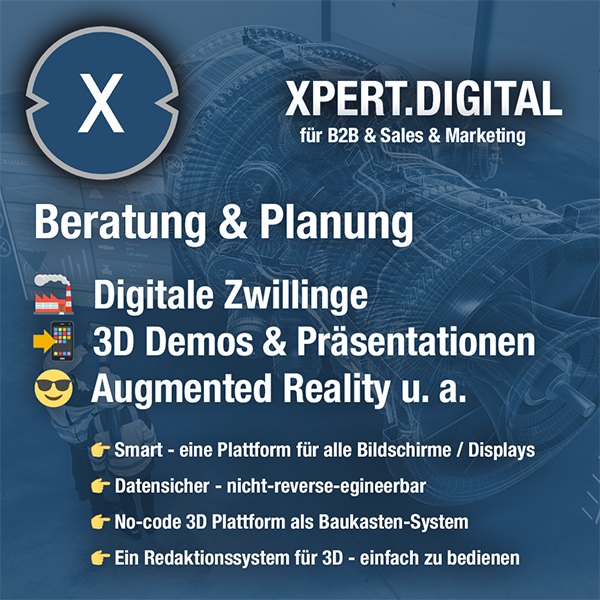
We are there for you - advice - planning - implementation - project management
Xpert.Digital - Pioneer Business Development
Smart Glasses & KI - XR/AR/VR/MR industry expert
Consumer metaverse or meta -verse in general
If you have any questions, further information and advice, please feel free to contact me at any time.
I would be happy to serve as your personal advisor.
You can contact me by filling out the contact form below or simply call me on +49 89 89 674 804 (Munich) .
I'm looking forward to our joint project.
Xpert.Digital - Konrad Wolfenstein
Xpert.Digital is a hub for industry with a focus on digitalization, mechanical engineering, logistics/intralogistics and photovoltaics.
With our 360° business development solution, we support well-known companies from new business to after sales.
Market intelligence, smarketing, marketing automation, content development, PR, mail campaigns, personalized social media and lead nurturing are part of our digital tools.
You can find out more at: www.xpert.digital - www.xpert.solar - www.xpert.plus



